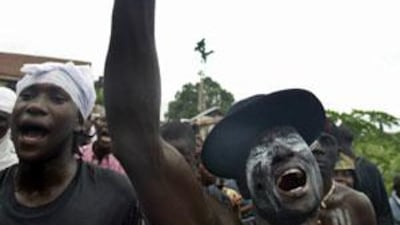The Other Hand Chris Cleave Sceptre Dh68 An "adventurous destination" is how Nigeria is billed when it lands on Sarah O'Rourke's desk in the form of a freebie holiday. Sarah is a London magazine editor trying to save her marriage in the wake of a decidedly unadventurous affair, and some off-the-beaten-track sunshine seems like the perfect tonic. Her husband is soon convinced, but what neither of them knows - not even Andrew, a newspaper columnist whose job it is to set the world to rights once a week - is that their Nigerian beach borders a vicious oil war.
They find themselves in the thick of it when two terrified teenage sisters run up to them, pursued by a pack of men wearing gold chains and torn jogging pants, murder in their eyes, machetes in their hands. As witnesses to atrocities, the girls must pay with their lives. But their pursuers offer Andrew a deal. "White man been giving me this finger all my life," the killers' leader says. "Today you can give it me to keep." If Andrew will chop off his middle finger, the girls walk free. But he can't do it in the end, and even though Sarah eventually seizes the machete and gives up her own middle finger, the men take the girls anyhow.
This is the backstory to Chris Cleave's pulpy tale of two women and one very big, capital-"I" issue: immigration. The bulk of the novel is set a couple of years later when the younger of the Nigerian girls, 16-year-old Little Bee, turns up on Sarah's suburban doorstep, having sailed to England as a stowaway and been incarcerated in a detention centre ever since. Her arrival coincides with Andrew's funeral.
Sarah's son, four-year-old Charlie, is forever dressed as Batman, a knee-high superhero bent on ridding the world of baddies. Little Bee's aspirations are more modest. She wishes only that she were a British pound coin. "A pound coin can go wherever it thinks it will be safest. "It can cross deserts and oceans and leave the sound of gunfire and the bitter smell of burning thatch behind." Instead, Cleave makes her into a kind of British everywoman, speaking the language she has learnt from British newspapers, dressing in cast-off clothes, and overflowing with obvious meaning.
Still, Little Bee is the best thing about the novel. She and Sarah take turns narrating, and while Sarah is problematic - surely we aren't supposed to find her as selfish and naive as she increasingly seems? - Little Bee's voice will immediately reel you in with its humorous blend of heartbreak and hope. Little Bee's release turns out to have been a clerical error, and while the widowed Sarah flails about, trying erratically to help, a ghoulish, melodramatic subplot centring on Andrew's death quickens the pace. Cleave's debut novel, Incendiary, was framed as a letter to Osama bin Laden about a London bomb plot. Unfortunate timing - the release date was 7/7 - masked its mawkishness, but it's all on show here: the twee toddler, the toe-curling office seduction scene, the hokey, overworked images.
"A story is a powerful thing in my country, and God help the girl who takes one that is not her own," Little Bee says early on. It's tempting to think how much better this particular story might have been were it told by one of Nigeria's own young writers, such as Helon Habila or Chimamanda Ngozi Adichie. Dave Eggers' What Is the What facilitates a fairer but no less flattering comparison. As for The Other Hand, it reads too much like a novel written with Middle England reading groups in mind.

